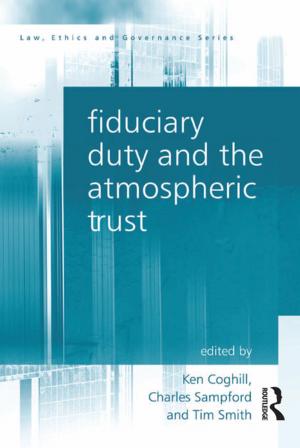The Global Climate Regime and Transitional Justice
Business & Finance, Economics, Sustainable Development, Nonfiction, Science & Nature, Nature, Environment, Ecology, Social & Cultural Studies, Political Science, Government, Public Policy| Author: | Sonja Klinsky, Jasmina Brankovic | ISBN: | 9781351854917 |
| Publisher: | Taylor and Francis | Publication: | April 27, 2018 |
| Imprint: | Routledge | Language: | English |
| Author: | Sonja Klinsky, Jasmina Brankovic |
| ISBN: | 9781351854917 |
| Publisher: | Taylor and Francis |
| Publication: | April 27, 2018 |
| Imprint: | Routledge |
| Language: | English |
Geopolitical changes combined with the increasing urgency of ambitious climate action have re-opened debates about justice and international climate policy. Mechanisms and insights from transitional justice have been used in over thirty countries across a range of conflicts at the interface of historical responsibility and imperatives for collective futures. However, lessons from transitional justice theory and practice have not been systematically explored in the climate context. The comparison gives rise to new ideas and strategies that help address climate change dilemmas.
This book examines the potential of transitional justice insights to inform global climate governance. It lays out core structural similarities between current global climate governance tensions and transitional justice contexts. It explores how transitional justice approaches and mechanisms could be productively applied in the climate change context. These include responsibility mechanisms such as amnesties, legal accountability measures, and truth commissions, as well as reparations and institutional reform. The book then steps beyond reformist transitional justice practice to consider more transformative approaches, and uses this to explore a wider set of possibilities for the climate context.
Each chapter presents one or more concrete proposals arrived at by using ideas from transitional justice and applying them to the justice tensions central to the global climate context. By combining these two fields the book provides a new framework through which to understand the challenges of addressing harms and strengthening collective climate action. This book will be of great interest to scholars and practitioners of climate change and transitional justice.
Geopolitical changes combined with the increasing urgency of ambitious climate action have re-opened debates about justice and international climate policy. Mechanisms and insights from transitional justice have been used in over thirty countries across a range of conflicts at the interface of historical responsibility and imperatives for collective futures. However, lessons from transitional justice theory and practice have not been systematically explored in the climate context. The comparison gives rise to new ideas and strategies that help address climate change dilemmas.
This book examines the potential of transitional justice insights to inform global climate governance. It lays out core structural similarities between current global climate governance tensions and transitional justice contexts. It explores how transitional justice approaches and mechanisms could be productively applied in the climate change context. These include responsibility mechanisms such as amnesties, legal accountability measures, and truth commissions, as well as reparations and institutional reform. The book then steps beyond reformist transitional justice practice to consider more transformative approaches, and uses this to explore a wider set of possibilities for the climate context.
Each chapter presents one or more concrete proposals arrived at by using ideas from transitional justice and applying them to the justice tensions central to the global climate context. By combining these two fields the book provides a new framework through which to understand the challenges of addressing harms and strengthening collective climate action. This book will be of great interest to scholars and practitioners of climate change and transitional justice.















